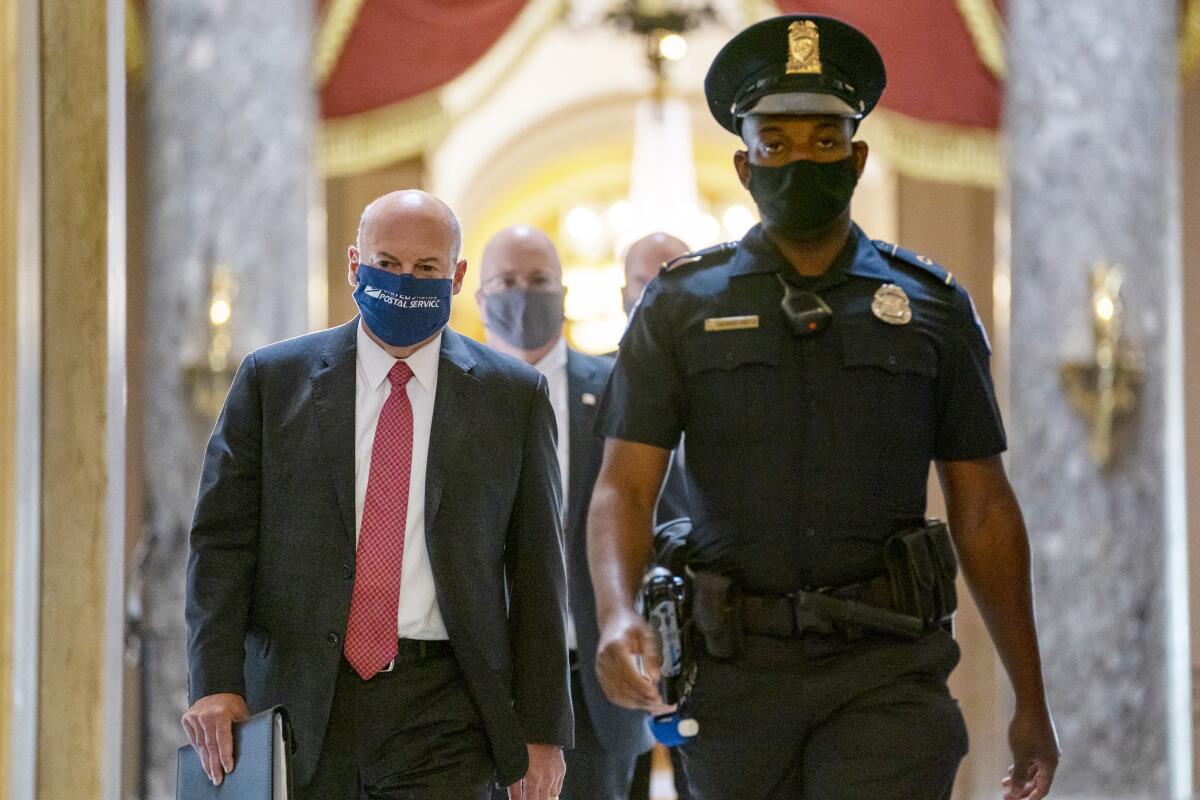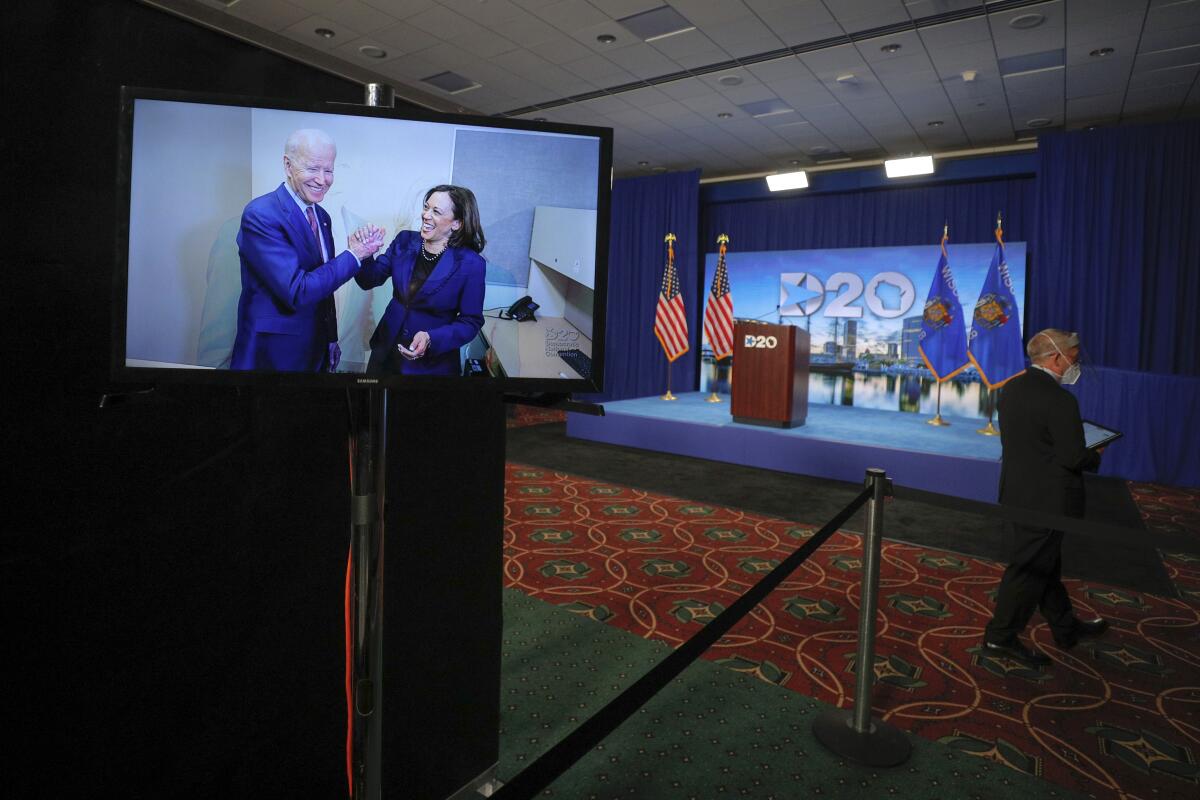Newsletter: What’s going on with the Postal Service?

- Share via
Good morning, and welcome to the Essential California newsletter. It’s Wednesday, Aug. 19, and I’m writing from Los Angeles.
Sign up for Essential California
The most important California stories and recommendations in your inbox every morning.
You may occasionally receive promotional content from the Los Angeles Times.
The state of California announced Tuesday that it would be taking the Trump administration to court for “the 96th time,” as state Atty. Gen. Xavier Becerra joined several other states in suing the administration over the cutbacks to the U.S. Postal Service that they say could interfere with mail-in voting.
The move came as Postmaster General Louis DeJoy said that he would be suspending the changes until after the election, amid growing outcry over the cutbacks. But his promise did little to assuage Democrats’ worries that the Trump administration is trying to undermine the mail system for an advantage at the ballot box this fall, when tens of millions of Americans are likely to vote by mail amid the pandemic.
[Read the story: “Postmaster general suspends USPS changes until after election; Democrats keep pressure on” in the Los Angeles Times]
DeJoy, a major Trump donor who was appointed to lead the Postal Service in May, is the first postmaster general in nearly two decades who had no prior Postal Service experience. Since taking the reins at the agency, the former logistics CEO has drastically restructured the top leadership of the post office, frozen hiring and implemented an “operational pivot” aimed at cutting overtime and late and extra trips. The result, as my colleague Arit John noted in a recent story, has been widespread reports of delayed mail. Members of Congress from both parties have raised concerns about post office closures and service reductions.
[Read more: “‘Chaos and confusion’: What is going on at the post office and how could it affect mail voting?” in the Los Angeles Times]
Why the outcry has reached a fever pitch
Last Thursday President Trump said he would reject a Democratic proposal to funnel $25 billion in extra funding to the Postal Service to help with the expected deluge of mail-in ballots — even though the agency’s board of governors, which Trump appointed, had recommended the $25-billion boost. The president, who has repeatedly made unfounded accusations that mail voting leads to widespread fraud, made clear that the decision was part of a White House effort to limit Americans voting by mail.
[Read the story: “Trump vows to block new Postal Service funding to undercut voting by mail” in the Los Angeles Times]
A day later, the Postal Service confirmed that it had issued a warning to 46 states, including California, of “significant risk” that some voters might be disenfranchised because of state deadlines for delivering last-minute ballots. (As noted in this story from my colleagues Laura King and John Myers, California is actually better suited to weather a potential election postal crisis than many other states, because it has one of the nation’s most generous laws in allowing extra time for ballots to be received by elections officials.)
Some background
The U.S. postal system’s core role in American society predates the country itself. The Post Office Department, the predecessor of the USPS, was borne out of the Second Continental Congress in 1775 — a year before the Declaration of Independence was signed.
Safeguarding democracy has always been central to its mission: According to an official history, the very first major postal law passed by Congress subsidized the cost of newspaper delivery in the young country, because the Founding Fathers believed that a free press was essential to democracy, and that the postal system should play a role in upholding those principles.
And even in these hyper-partisan times, the Postal Service is almost universally liked: A Pew Research Center survey conducted last year found that 91% of Americans view it favorably, more than any other federal agency.
[See also: “Facing dangers from coronavirus and Trump, postal carriers just keep delivering the mail” in the Los Angeles Times]
However, it wouldn’t be fair to call the USPS an entirely nonpartisan topic: As my D.C. colleague Evan Halper noted a few months ago, the financially imperiled agency has long been a punching bag for the right, and Trump’s persistent attacks on the agency have made it “a surprisingly potent and resilient symbol for a fractured Democratic Party anxious for unifying causes.”
The agency was financially embattled long before the coronavirus, but the pandemic has led to staff shortages and a steep decline in letter mail, the most profitable part of the service, worsening its already precarious financial situation.
What comes next
Quite a lot will be unfolding over the next few days. On Friday, DeJoy will testify before the Homeland Security and Governmental Affairs committee in the Senate. On Monday, DeJoy will face a grilling in Congress’ other chamber, when he appears before the House Oversight Committee alongside Robert M. Duncan, the chairman of the USPS board of governors. (In today’s random piece of California trivia, L.A. County Supervisor Kathryn Barger’s brother John Barger also sits on the 11-member board of governors that oversees the USPS.)
And earlier this week, Speaker Nancy Pelosi called the House — which is currently in summer recess — back to D.C. to work on passing a bill aimed at rolling back the cutbacks. They are expected to vote on the bill as soon as Saturday. As my D.C. colleague Jennifer Haberkorn explained in her story, the bill is likely to be largely symbolic, as Senate Majority Leader Mitch McConnell (R-Ky.) has not signaled any willingness to call his chamber back to vote on the measure, which would be required for it to become law.
In the meantime, Californians can can sign up to track the status of their vote-by-mail ballots here, and check their voter registration here.
And now, here’s what’s happening across California:
Gov. Gavin Newsom has declared a statewide emergency to help California respond to the fires burning across the state amid an extreme heat wave. More than 30 wildfires are burning in California, including nearly a dozen that started in the last two days, according to officials with the California Department of Forestry and Fire Protection and a Times analysis. Los Angeles Times
Note: Some of the sites we link to may limit the number of stories you can access without subscribing.
L.A. STORIES
Hollywood shocker: NBCUniversal ousted longtime Universal executive Ron Meyer on Tuesday after learning he tried to cover up hush-money payments to a woman — a scenario that Meyer said led to an extortion plot. The woman at the center of the scandal is a 28-year-old actress named Charlotte Kirk — the same actress whose involvement with former Warner Bros. chief Kevin Tsujihara led to Tsujihara’s resignation last year, after text messages that suggested he would help find acting jobs for her became public. Los Angeles Times
LAUSD’s first day back to school, online and on Zoom, was anything but normal. Campuses are deserted except for a skeleton staff, but some 30,000 teachers from 1,400 schools fired up their computers from home. Los Angeles Times
The “Ellen” scandal has gripped us in part because it’s so familiar: From “Larry Sanders” to “The Morning Show,” TV sees itself as an awful place to work. Los Angeles Times
Not quite as good as being there in person, but better than nothing: KCRW announced a new series of on-air broadcasts of iconic Hollywood Bowl performances. KCRW
Eastside political activist Grace Montañez Davis has died at 93. Montañez was the first Mexican American woman to serve as Los Angeles’ deputy mayor. Los Angeles Times
Support our journalism
POLITICS AND GOVERNMENT
Democrats on Tuesday bestowed former Vice President Joe Biden with the prize he has chased for more than 30 years, beginning with a roll call that virtually touched down in every state and territory and ended with his nomination for president. Los Angeles Times

President Trump’s 2016 campaign capitalized on Russia’s efforts to meddle in the U.S. election four years ago, according to a bipartisan Senate Intelligence Committee report that raises new concerns about connections between his top aides and Moscow. Los Angeles Times
Gov. Gavin Newsom signed a bill requiring all 430,000 California State University undergraduates to take ethnic studies, a notable rebuke to the university’s governing board, which had passed its own, much broader requirement last month. Los Angeles Times
CRIME AND COURTS
Cal athletics and Under Armour are locked in a bizarre legal dispute. At stake is $58 million in cash and product remaining on a 2016 10-year contract that was never formally signed. (Without a formal contract, both sides have been working off a term sheet, also from 2016.) Mercury News
HEALTH AND THE ENVIRONMENT
A spray salesman is peddling a wildfire cure, and California’s rich are buying it: As climate change exacerbates fire risk, desperate homeowners are turning to unproven fixes to protect their property. Bloomberg
CALIFORNIA CULTURE
Californians are required to wear face coverings while in public, but are people actually following the rules? Last month over the course of a week, we sent reporters to three locations in Los Angeles and Orange counties to find out. Los Angeles Times
A San Francisco restaurant that made headlines for launching $200-per-person meals inside geodesic domes is ordered to remove the domes. “After attracting news coverage, [Japanese fine dining spot] Hashiri received hate mail from people seeing the domes as anti-homeless. That’s why Hashiri manager Kenichiro Matsuura suspects someone anonymously complained to the Department of Public Health about the domes, resulting in a surprise visit on Thursday.” San Francisco Chronicle
After 20 years, ground has finally been broken on an “intentional community” for adults with disabilities in Half Moon Bay. Once the project is completed — ideally about 18 months from now — the father who advocated for it would like to see it become a model for other supportive housing communities around California and the nation. Mercury News
A poem to start your Wednesday: “To the Consolations of Philosophy” by W.S. Merwin. Poetry Foundation
Free online games
Get our free daily crossword puzzle, sudoku, word search and arcade games in our new game center at latimes.com/games.
CALIFORNIA ALMANAC
Los Angeles: sunny, 93. San Diego: partly sunny, 84. San Francisco: windy, 76. San Jose: partly sunny, 91. Fresno: windy, 109. Sacramento: sunny, 102. More weather is here.
AND FINALLY
Today’s California memory comes from Barbara Hagen:
I arrived in Los Angeles, April 1, 1973, with my set of white American Tourister luggage, a dubious new husband and big ambitions. My cousin Nancy gave us a tour of the town. As she drove through residential neighborhoods, I was awe-struck by the purple canopies of blooming jacaranda trees. Was it an April Fool’s joke? I felt triumphant as I remembered Mrs. Huntune, my first-grade teacher, who had looked dismissively at one of my drawings and proclaimed that trees are not purple in her pinchy-faced way. I was sure I was in the right place at last.
If you have a memory or story about the Golden State, share it with us. (Please keep your story to 100 words.)
Please let us know what we can do to make this newsletter more useful to you. Send comments, complaints, ideas and unrelated book recommendations to Julia Wick. Follow her on Twitter @Sherlyholmes.
Sign up for Essential California
The most important California stories and recommendations in your inbox every morning.
You may occasionally receive promotional content from the Los Angeles Times.




